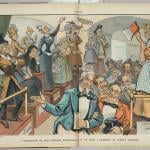It is always a dangerous thing to make categorical statements about either/ors when you are in a situation of already and not. Tom, however, following the lead of his doctor father George Caird, and others says on p. 1281— “Either the history of Rome provides the true story, with Christian faith content to shelter as a permitted religion under its banner. Or the history of Israel climaxing in the crucified and risen Messiah must be seen as the true story, with that of Rome however much under the overarching divine providence as at best a distorted parody of the truth.” The problem is that Paul does not think that the former story has already fully eclipsed the latter story, and the latter story is still ongoing,the rulers of this world have not yet been called to full account, and in fact that will not happen until Christ returns. True, the Roman story, as part of the schema of this world which is already passing away (but has not yet fully passed away) is not the story Christians are to adhere to or live out of. True, as well, where there are parallels between the stories, that that story is a pale shadow of the story Paul is telling in the NT about God’s people. But here is where the wheels come off Tom’s wagon, and it goes back to a misreading of Dan. 7 which leads to a probably misreading of Col. 2.14-15 (and related texts– see Ephes. 6) and as we already saw, a misreading of even 1 Cor. 15 when it refers to Christ putting things under his feet. So let’s start with the root of the rot— a misreading of Dan. 7.
Tom has long maintained that Dan. 7 is not about a Son of man figure descending on the clouds to judge and rule the world, and this in spite of the fact that the Yom Yahweh was always seen in OT prophecy to take place ON EARTH, not from heaven. No, says Tom, this is about a Son of Man ascending to the right hand of God and ruling from there. Whatever the merits of this view, it was certainly not Jesus’ view of that text as any fair exegesis of Mk. 14.62 where Paul says that the Son of Man will be seen sitting on God’s right hand and then coming on the clouds to judge the rulers of this world— including Caiaphas. That of course was the straw that broke the camel’s back and led to the handing over of Jesus. Nor should we forget that Paul also draws on this same imagery from Dan. 7 to talk about the return of Christ– in 1 Thess. 4.16 we hear about his coming down from heaven, about the angelic trumpet blast, and the res. of believers— and where exactly are they to go out and meet Christ? In the clouds says Paul, because he was coming on the clouds of course. Now I agree this is metaphorical language, but when the phrase ‘coming on the clouds’ is used of Yahweh’s descent to judge the world in the OT in theophany texts, this is the right way to read Dan. 7 and the related NT texts whether it involves literal cumulo-nimbuses or not!
So when we come to Tom’s take on Col. 2.14-15, following Caird, and he assumes that the powers and principalities referred to there are human rulers rather than the supernatural powers and principalities, while this is not impossible as a reading of the text, it is also not likely. As I have argued in my Philemon, Colossians, and Ephesians commentary (see pp. 159-60), Paul is talking about Christ’s victory over the dark powers on the cross, and his disenfranchising of them, stripping of them through his cross, resurrection, ascension. Indeed, Paul can even use the image of the ascension as being like a Roman triumph in which he leads captivity captive with him as he ascends, presumably parking them in Tartarus as 1 Pet. 3 and the parallels in Jude and 2 Peter suggest— the spirits in prison are the fallen angels in 1 Pet. 3, said in Jude and 2 Peter to have been incarcerated. And furthermore, as I say on p. 160 of my commentary “nowhere else in Colossians does Paul address the relationship of his audience with human powers or authorities. When he does so in Romans 13, he says nothing about the authorities having been stripped of power or authority, Quite the contrary he speaks of their being empowered or authorized by God. Furthermore, what would it have meant to the Colossians (who in any case were not part of a Roman colony city or under direct Roman rule) that Christ’s death had disenfranchised the Roman authorities, and how would that have helped them to deal with the false religious philosophy in Colossae, which had to do with angels!!!! Furthermore, when we get to Ephes. 6.12 Paul says emphatically “for our struggle is not against flesh and blood but against the rulers of this dark world and against the spiritual forces of evil ‘in the heavenly realms’ !!!!!! Not on earth, in the heavenly realms. In short, the attempt to relate these sorts of passages to Paul’s current view of current Roman authorities fails. Of course Paul is opposed to idolatry and immorality in any form. This includes the Emperor cult. But that is neither here nor there when it comes to whether Paul things the emperor and other kings have current legitimate authority now, even over Christians, and Rom. 13 makes clear he does.
The proper way to ask the questions Tom is asking on pp. 1282-83 is– At what points does Paul see his Christian narrative at odds with and in conflict not just with idolatry of various sorts, but with the Roman rulers and the Empire? At what point will they be supplanted on earth by Christ’s kingdom. And the answer is—– LATER. Not now. It is also true that Paul believed that God held empires and emperors to account when they behaved badly, both now and later, but those temporal judgments are not final judgment, and they do not displace the rulers of this world as legitimate rulers of this world pro tempore, until Christ returns. This of course raises the question of what Christ’s rule from heaven amounts to. It does not amount to the displacement of all earthly institutions, whether we think of governments or the institution of marriage or business etc. Those things keep rolling along. It does amount to God working all things together for good for those who love him. It does amount to Christ being Lord in a particular and direct and tangible way of his people. But like all these other things it is a matter of already and not yet. The point is just this— Tom’s Empire critique is too much ALREADY, and not enough not yet. And it doesn’t match up with what Paul actually says on these matters. A critique of the sins and idolatry of rulers is not a critique of ruling or of human governments as institutions. See now Chris Bryan’s fine book Render unto Caesar. More in the next post.












